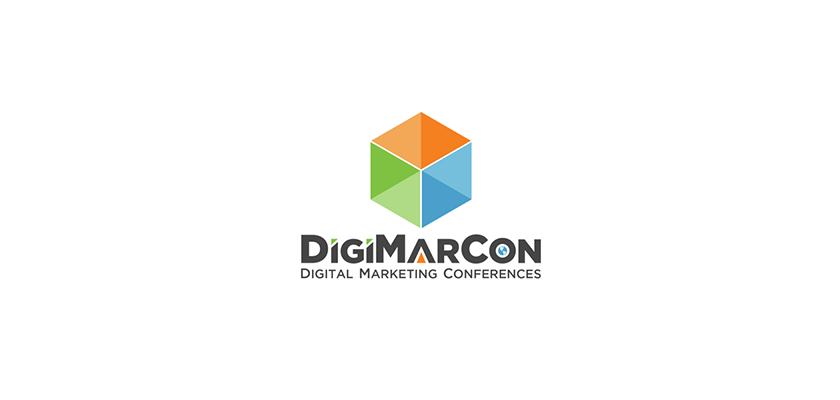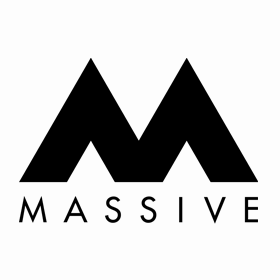
Digital Marketing Agency Pricing Guide: How Much Should You Charge?
For any business owner, the primary concern is to make sure that their business makes money. Just like every other industry, competition is fierce in the world of digital marketing.
That only means you’ll need to have competitive prices so that customers are attracted to your agency. But you still need to make a profit in order to keep your digital marketing agency up and running.
Moreover, a profit is a healthy incentive that every business requires to thrive and grow.
Which Criteria Should You Use to Decide the Digital Agency Fee Structure?
This can be one of the most challenging questions faced by those starting a digital agency. As a general business rule, the product’s price must be such that it covers the cost of the service rendered and the overhead expense. In digital marketing, you can base your pricing model on the cost of the specific services you provide.
But remember, your digital marketing agency pricing model can either make or break you. It can influence various aspects of your agency, from who you hire to how you pitch. So it’s imperative that you choose a pricing model that aligns with your long-term goals.
Selecting a Reasonable Price
Digital agency rates can vary, especially those that outsource their work. They can afford to cut prices without dipping significantly into their profit margins. But how do you quote a price that is in line with customer expectations and covers the cost of running your agency?
Here are a few factors that will help you determine how much to charge.
1. How Much Does It Cost to Run the Agency?
Several expenses influence this figure, such as:
- Office expenses- Whether you work from home or have a dedicated office, operational costs include rent, utilities, equipment, maintenance, supplies, etc.
- Production expenses- To run efficient campaigns, digital agencies have to invest in multiple tools and software. The list is endless, but common ones include office productivity software, task management software, CRM, SEO tools, email marketing, social media automation software, etc.
- Employment costs- Besides salaries, digital agencies need to take into account things such as benefits, insurance, and bonuses.
- Professional fees- Running a business comes with its own bucket load of expenses, from government licensing fees to corporate taxes to attorney fees. These should never be overlooked.
- Additional expenses- Every business needs extra capital to help it grow. Digital marketers need to allocate an amount that allows them to cover variable costs of marketing such as advertising, conference fees, directory listing fees, etc. This may also include travel and accommodation expenses. For others, it could also involve loan repayments.
2. The Digital Marketing Agency Pricing Model You Wish to Implement
As a digital marketer, there are various pricing structures that you can use to charge your clients. Whether you decide to charge your clients upfront, 50 before 50 afterward, or on completion is up to you and the services you are offering.
Here are some of your options:
1. Hourly-based
This is the ideal approach for agencies that are just starting out and are unsure of how long a project can take. Moreover, it’s the simplest way to bill your clients, especially those who ask for lots of edits or revisions.
The important thing here is to remember that your hourly rate needs to be such that it maintains the agency’s upkeep. However, make sure to inform your clients on how long the project could take, keeping a few extra hours leeway for yourself. More importantly, if you want to scale, you may end up raising digital agency pricing or move to a different pricing model.
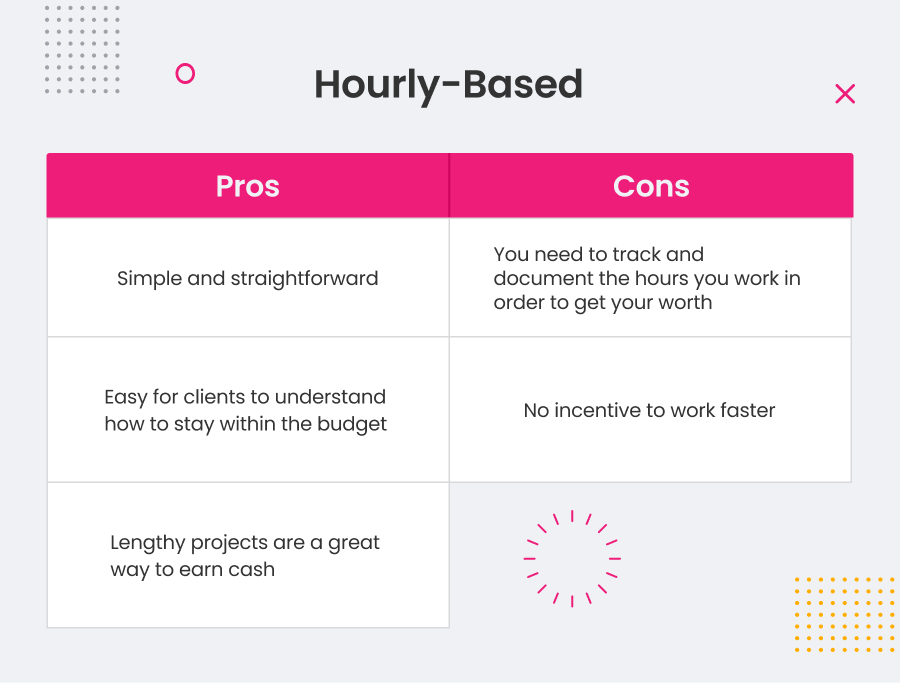
2. Project-based
Charging a flat fee for any project is a simple way to run a digital marketing agency, especially if you have the skills and resources for a particular service.
So instead of invoicing the time you spend, you base it on your expertise. To accurately price the cost of your projects, whether it’s developing a social media ad campaign or a brand-enhancing identity package, have an estimate of how many hours it could take.
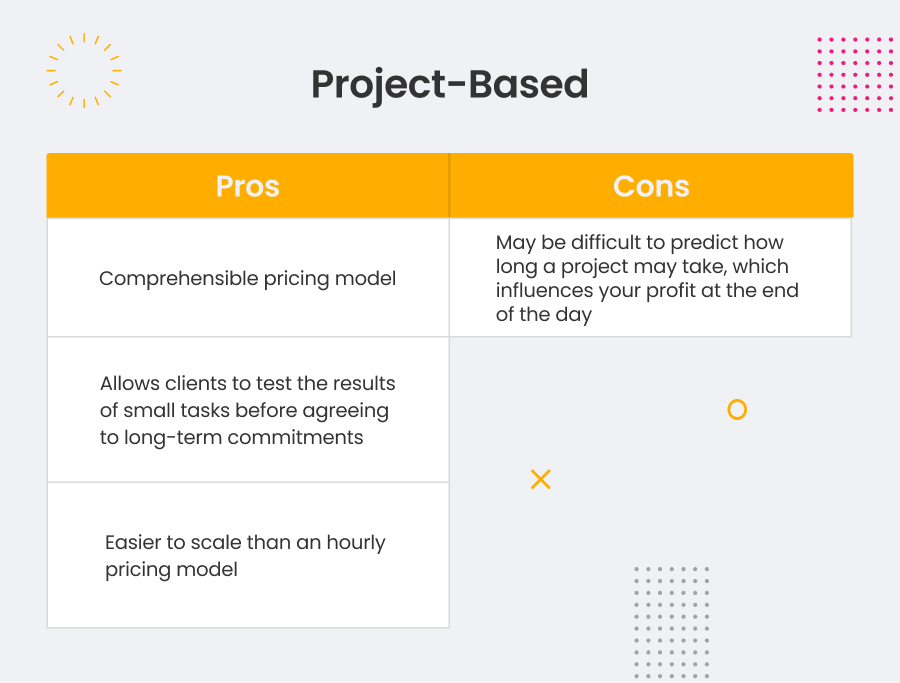
3. Retainer Model
Once you’ve established a relationship with your clients and are able to produce a large volume of work each month, you can move onto a retainer pricing model.
This is where your customers agree to a prepaid sum. Depending on what your job is, it could either be a fixed amount of time (hours-per-month retainer) or a set number of deliverables per month.
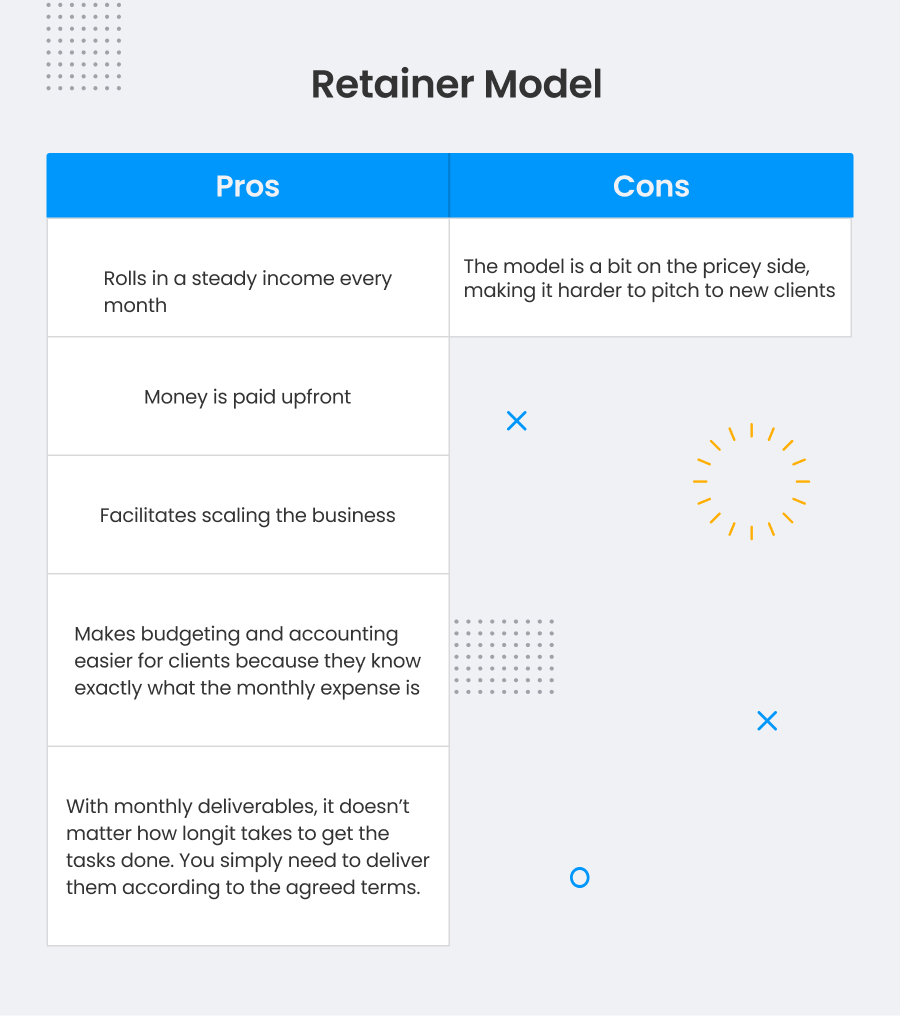
4. Recurring Model
Certain digital marketing services, such as SEO, are long-term projects. By offering flexible or discounted annual digital marketing agency pricing plans, you are in a position to claim a lasting relationship.
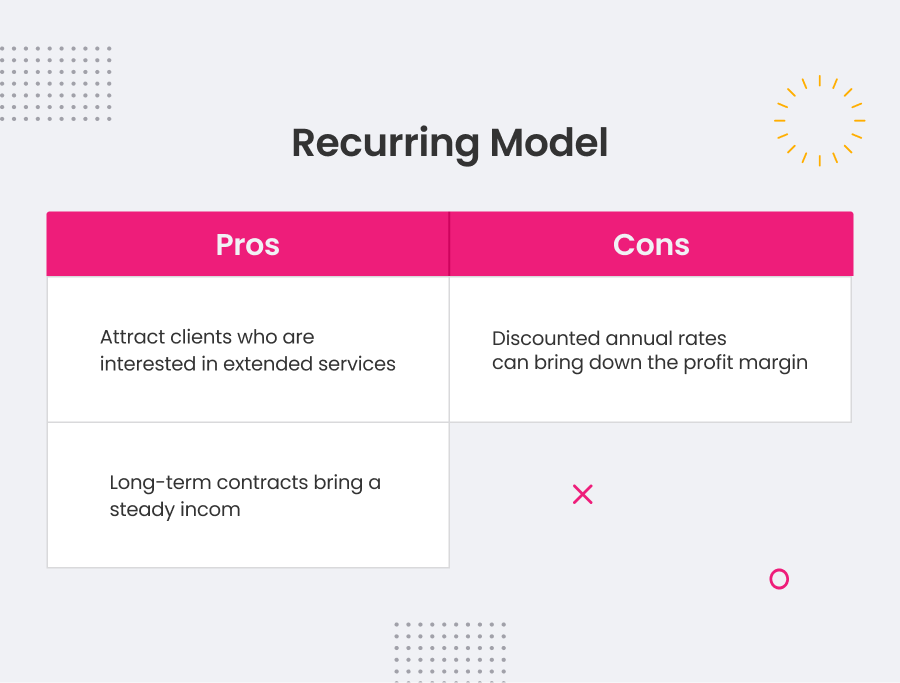
5. Performance-based
When you’ve worked hard to build a reputation for your agency, and you know that you can drive positive results, consider moving on to a performance-based pricing model for your digital marketing agency. Of course, you’ll need the backing of the right metrics to prove your efforts.
For example, you could agree upon a percentage of all sales the company closes.
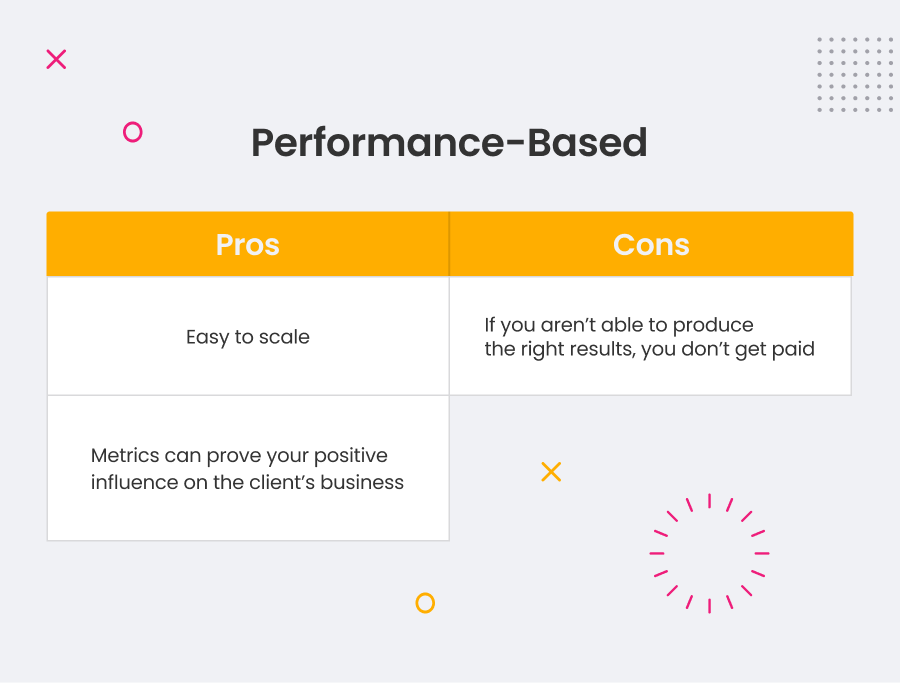
6. Value-based
Value-based pricing is based on the value you bring to your client’s business and the solutions you provide to their current problems.
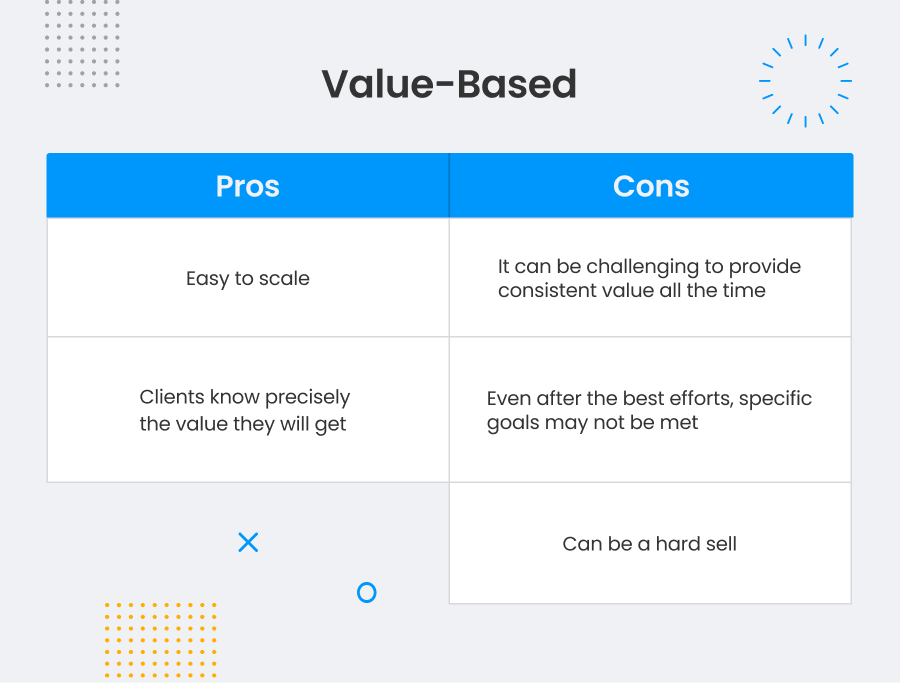
7. Customized Pricing
Digital marketing is an evolving profession. You may be able to devise a pricing structure that provides services that cater to your clients’ specific needs.
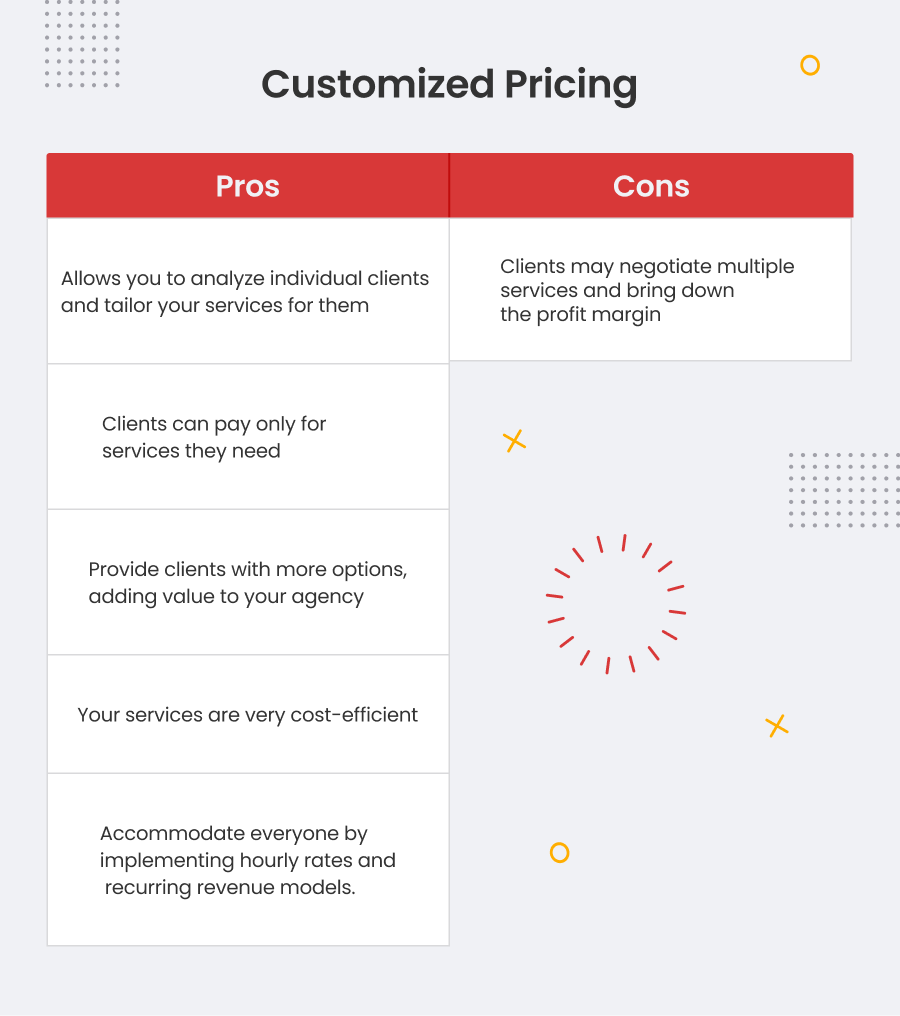
3. The Services You Intend to Provide
Digital marketers who are establishing their agencies should also look into avenues that can help to grow the business. This includes considering to offer a variety of marketing services. By devising a customer-oriented digital agency business plan, you can align your services with high demand.
Moreover, you will be able to accurately price them so that you remain profitable at all times. The formula is simple: cost + markup = price. Most agencies charge a 20% to 50% markup. But how do you price specific services, such as social media management, SEO, PPC, etc.? You’ll need to understand the costs and roles associated with each service. And since each one is different, let’s dive a bit deeper.
1. Social Media Marketing Agency Pricing
SMM helps businesses to connect with customers, build a community around the brand, leverage brand awareness, improve brand loyalty, boost customer satisfaction, and increase sales.
So you have a comprehensive job that includes analyzing the audience, and then developing and executing a strategy that aligns with them. It also involves ads management, one of the most important SMM services.
Social media management includes a variety of tasks. You need to be on top of additional tools and staff you may need to complete them. For instance, a creative director, strategist, or video editor can up the level of services you provide.
So when quoting a price, keep in mind the cost, time, and value of your services that should encompass the following:
Community Management
- Determining the ideal audience
- Devising a campaign strategy that targets the customer persona
- Understand the business goals
- Connect with customers
- Reply to comments quickly and appropriately
Content Creation
- Create content that aligns with customer preferences
- Organize a content calendar
- Audit competitors
Monitor Conversations
- Watch relevant hashtags and influencers
- Increase reach by joining relevant conversations
- Be aware of target keywords that are trending on various social media channels
Working With Influencers
- Track companies, followers, products, and topics that align with the brand image
- Filter out clickbait
Analytics
- Monitor, analyze, optimize, and report the metrics that matter the most in the SMM campaigns.
What is the range of hourly rates for social media marketing services?
The range of hourly rates for social media marketing services vary depending on the location but we have gathered a few examples for you to get an idea.
In the U.S., hourly rates for social media marketing services are approximately as the following:
General Social Media Management in the U.S. costs around $25 to $40.
Social media advertising in the U.S. costs around $35 – $60.
For social media content creation, you can expect to pay around $30 – $50, and for social media analytics, the cost ranges from $40 to $70.
However, social media marketing agencies in New York charge around $40 to $190 per hour.
2. SEO Management Pricing
There’s a lot that goes into SEO management, from the content to keywords to image metadata. But SEO can be broken down into three main types:
- Local SEO- how local businesses can appear in ‘near me’ searches.
- On-Page SEO- ensures all aspects of a website are optimized for search engines, such as images, keywords, URLs, page speed, mobile-friendliness, linking strategy, UX, etc.
- Off-Page SEO- activities are done off your website to raise the ranking with search engines, for example, links to your site from external sources, forums, influencer outreach, etc.
SEO is a long process that requires constant auditing and maintenance. Besides content and keywords, SEO also focuses on ranking and traffic. As an ongoing service, so how do you price SEO services? For many, project-based pricing or a recurring model are preferred options.
What is the average cost of SEO services per month?
While the cost varies based on the agency’s expertise and location, here are some examples:
In the UK, small businesses can expect to pay £250 to £1,000 monthly for SEO services. For enterprise plans and local SEO, these prices can range from £1,000 to £3,000+.
In Europe, small businesses typically pay €500 – €1,500 monthly for SEO services. Enterprise plans may range from €1,500 – €4,000, and the base cost for local SEO starts from €4,000.
Particularly in Germany, hourly rates for SEO services range from €30 to €150, depending on the agency’s scope and the services you require.
3. PPC Pricing
Much like advertising, PPC is a great way of getting your website in front of people. That’s why many consider Pay-Per-Click marketing as paid SEO. These days, most of it is done through AdWords. Your job is to strategize, set up, manage, and report on marketing campaigns on this platform. Progress is monitored, either weekly, monthly, or quarterly, and campaigns are tweaked accordingly.
There are multiple pricing models when it comes to PPC services, ranging from hourly rates to flat rate to a monthly retainer model. Others charge a percentage of the ad spend while some client’s package PPC services with other digital marketing needs. At the end of the day, you need to choose a pricing structure that suits both you and your client.
How much does it typically cost to run a PPC campaign in the UK?
For small-scale PPC campaigns in the UK, businesses typically invest between £500 and £2,500. This budget range suits companies with modest advertising needs seeking effective online visibility.
Medium-sized PPC campaigns in the UK come with an average cost ranging from £2,500 to £7,500. This level of investment caters to businesses pursuing more extensive online advertising strategies.
For large-scale PPC campaigns, businesses in the UK often allocate budgets starting at £7,500 and beyond. These substantial investments are ideal for enterprises aiming for comprehensive and impactful online advertising efforts.
4. Web Design and Development Pricing
Web design and development services cover not only the look of a website but also its functionality and ease of use. When it comes to pricing, there are several approaches. Project-based pricing is popular for well-defined projects, offering clarity on costs. Hourly rated, on the other hand, works well for ongoing work or projects with changing requirements. For continuous web support, a retainer model ensures dedicated assistance. Alternatively, value-based pricing is used for complex projects that deliver significant business value. The right pricing strategy balances the agency’s expertise, project demands, and client expectations, ensuring both quality service and business viability.
What is the cost of receiving web design and development services in Europe?
For a small business website, you can expect a budget-friendly investment ranging from €3,000 to €10,000. Medium-sized businesses looking for comprehensive web solutions may allocate between €10,000 and €30,000 for a robust online presence. Larger enterprises with intricate requirements and extensive functionalities can anticipate an investment starting from €30,000 and beyond.
5. Content Management Pricing
Think of content as the storyteller that captivates your audience. From blog articles and infographics to videos, e-books, and whitepapers, each content type serves a unique purpose. The goal is to tailor content for various stages of the buyer’s journey, providing valuable information and building a connection with your audience. Successful content marketing hinges on a deep understanding of target audiences, strategic alignment with business goals, and a strong integration with SEO. You might wonder how to charge for content marketing services though.
Pricing structure options range from hourly rates for smaller projects to project-based feed for specific campaigns. Retainer models are ideal for ongoing content management, while performance-based pricing aligns agency fees with client success. Packaged services can also offer a comprehensive solution at a fixed cost, catering to clients with well-defined content needs. Each model, however, should be chosen based on the agency’s strengths and client objectives.
How much do digital marketing agencies charge for content marketing services in the U.S.?
As mentioned, the cost of content marketing services in the U.S. can vary widely depending on factors such as the scope of services, the expertise of the content marketing agency, and the specific needs of the client.
Monthly retainers for standard services range from $1,000 to $5,000, while project-based engagements span from $2,000 to $10,000, contingent on complexity. For larger enterprises and comprehensive solutions, top-tier content marketing agencies provide monthly retainers starting at $5,000 and project-based services commencing at $10,000, adapting to the scale and intricacy of your content marketing requirements.
6. Video Marketing Pricing
Video marketing services has become an integral part of digital marketing. It involves creating and promoting video content to boost engagement and brand awareness. The pricing for these services varies widely, depending on the complexity of the video, length, production quality, and additional elements like animation or special effects. Common pricing structures; however, include project-based feed for individual videos or campaigns, which offer clear cost expectations upfront. Hourly rates might apply to editing or post-production work. Some agencies also offer package deals, bundling video production with promotional strategies for a comprehensive solution. For businesses, investing in video marketing often translates into higher engagement and a stronger online presence, making it valuable component of their digital strategy.
What is the typical cost of video marketing services in the UK?
Depending on your location and the video marketing service you require here are the estimated costs of video marketing services in the UK:
- Simple Explainer Video (Under 1 minute) costs between £1,000 – £5,000.
- Product Demo Video (1-3 minutes) costs approximately between £5,000 – £15,000
- Animated Video (2-3 minutes) services costs approximately £10,000 – £25,000+
- Live-Action Video (3-5 minutes) services starts from £20,000 and can go up to £50,000 and more.
7. Creative Services Pricing
Picture your brand as a canvas waiting to be painted with creativity. Creative services encompass a wide range of activities aimed at enhancing brand visibility and appeal through innovative and engaging content. These services include graphic design, branding, advertising, multimedia production, and creative strategy development.
Pricing for creative services can be quite varied. Some agencies opt for project-based pricing, charging a flat fee for a specific deliverable like a branding package or an advertising campaign. Others prefer an hourly rate, particularly for ongoing work like social media graphics or website updates. Additionally, retainer agreements are common for long-term partnerships, ensuring regular creative support. The key to pricing creative services lies in balancing the value of the artistic and strategic input with the client’s budget and the project’s complexity, ensuring a sustainable and mutually beneficial relationship.
8. Influencer Marketing Pricing
Influencers come in various shapes and sizes, from social media influencers to bloggers and industry experts. The key lies in choosing influencers whose audience aligns with your brand. Micro-influencers, with niche followers, offer a targeted approach.
No doubt that influencer marketing strategy has become a key element in today’s digital landscape. To promote products, services or brands, partnering with influential people on social media is highly effective. Although it is effective and important, the pricing for influencer marketing varies greatly based on the influencer’s reach, platform, and engagement rates. Typically, agencies may charge a flat fee for organizing and executing a campaign, which includes identifying suitable influencers, negotiating terms, and managing the collaboration. Alternatively, pricing can be commission-based, linked to the sales, or leads generated through the influencer’s promotion.
Some agencies also offer tiered packages, allowing businesses to choose the level of service based on their budget and campaign goals. This flexible pricing structure caters to a range of businesses, from startups to established brands, making influencer marketing an adaptable and effective tool for reaching target audiences.

Which Digital Agency Should Choose Which Pricing Model?
So, how to charge for marketing services? Your agency’s fee structure is up to you. However, digital marketing agencies employ various pricing models to cater to diverse client needs and project requirements. The choice of pricing model depends on several factors, including the nature of the project, client preferences, and agency expertise.
Hourly Rates: Hourly rates are suitable for agencies with well-defined scope of work and clients who are comfortable with hourly billing. This model offers flexibility and transparency, ensuring clients pay only for the time expended. We can say that this pricing model is best for small to medium-sized agencies focusing on customized, one-off projects. Ideal for web design, graphic design, and specialized consulting services.
Project-Based Pricing: This pricing model is ideal for agencies with experience in managing complex projects and clients who prefer predictable pricing. Project-based pricing model provides a clear upfront cost and eliminates the risk of overbilling.
Retainer Agreements: This is beneficial for agencies providing ongoing services and clients seeking consistent support. This model ensures a steady stream of revenue for the agency and ongoing commitment from the client. This model is suitable for agencies with a focus on long-term relationships and ongoing services like SEO, content marketing, and social media management. We believe its ideal for medium to large agencies with a stable client base.
Performance-Based Pricing: Performance-based pricing model is appropriate for agencies confident in their ability to achieve measurable results and clients prioritizing ROI. This model aligns agency fees with the success achieved for the client. This model is suitable for agencies with a strong track record and advanced analytics capabilities.

So exactly how much should I charge for your services?
Now, if you were expecting a particular number, I’m sorry to disappoint you. This blog acts as a mere guideline on what to consider when deciding a price and ways that you can charge your clients.
Every city and country has a different demand for digital marketing services. And only you can determine what the acceptable profit margin for running your digital marketing agency is.
After all, you are investing a considerable amount of your time, energy, and resources into providing valuable services to your customers. Keeping your work profitable will serve to make your efforts worthwhile.
So let’s take a closer look at a few reasons why digital agency fee structures can vary:
1. Firm/consultant experience
This factor has the most influence on the digital marketing agency pricing structure. The more experienced an agency is, the more it will charge.
Consider the following. When you hire an entry-level employee, you naturally pay them less than a more experienced one. Similarly, a digital agency that is new in the market has less experience in the trade and probably takes longer to get tasks accomplished.
On the other hand, an established, experienced firm has employees that have the necessary expertise to get more work done better and quicker. So the more specialized and experienced you are in the industry, the more you can be expected to get paid.
2. Internal costs
As mentioned earlier, a digital agency’s individual operating costs define the bare minimum required to keep the business afloat. Larger agencies tend to be a little less expensive than smaller ones because they can tap into economies of scale.
Having said that, you should also keep in mind that an individual consultant may charge higher prices than an agency because their time is finite. They focus on a few clients instead of taking on a bigger caseload.
3. Scope of work
Digital marketing campaigns can be billed at an hourly rate or services rendered. The more services a client needs, the greater the amount of time and resources you invest in completing the work, the higher the fee.
4. Industry-specific factors
Some industries are naturally more competitive than others. The more competitors in the industry, the greater the effort needed to stand out. So the budget required to dominate that industry will be much more. For example, a high-end fashion brand will need more aggressive marketing than a niche-specific brand related to organic gardening.
5. Market Location
In bustling urban centers and high-cost living areas, digital marketing agencies often face steeper operational costs, including rent, utilities, and salaries, leading them to set higher rates to maintain profitability. These major cities also tend to have a higher demand for digital marketing services, allowing agencies to command premium prices. However, this urban setting also breeds intense competition, encouraging agencies to specialize in niche markets or offer unique services, potentially attracting higher-paying clients.
Conversely, agencies in regions with lower living costs can afford to offer more competitive pricing, benefiting from lower overheads. This geographical dynamic is crucial, as it directly influences an agency’s pricing structure, balancing operational costs, market demand, competition, and client acquisition strategies.
6. Client Portfolio Diversity
Client portfolio diversity is yet another significant impact of a digital marketing agency’s pricing strategy. Agencies with a broad range of clients across various industries benefit from rich, varied experiences, making them adaptable and innovative. This diversity allows them to fine-tune their skills in different market segments, enhancing their value proposition. Additionally, a diverse client base can lead to economies of scale – as agencies streamline their processes for different sectors, they can offer more competitive prices. This varied portfolio also helps mitigate financial risks; if one sector faces a downturn, the agency isn’t heavily reliant on it. Thus, agencies with a diverse client base often have a strategic advantage in pricing, offering tailored solutions across a spectrum of industries.
Final thoughts
Choosing the right digital marketing agency pricing model can be overwhelming. So if you’re not sure of which one to implement or already have a model in place that’s not profitable for the agency, there’s no rule that says you can’t change it.
Taking the time to understand the pros and cons of different pricing models can help you achieve your goals quicker and guide your agency to the next level. For further reading, you can go to our best digital marketing agencies for startups or web accessibility for digital agencies articles.














